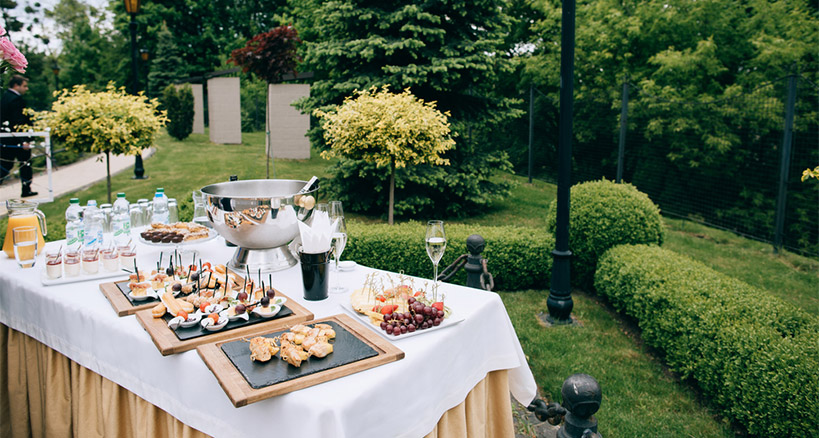
Opening a Catering Business – Part IIEarlier, we discussed the first steps you should undertake before launching a new catering business. These steps included researching the local competition, finding a niche for your business, identifying potential customers, and writing a business plan. In addition, we discussed contacting your state’s occupation licensing authorities and health department to find out exactly what you need (the National Federation of Independent Businesses website can help you in that regard). With those preliminary actions under your belt, you’re ready to move on to the next and more enjoyable stages: planning your enterprise.
Creating a Catering Menu with Pricing
Creating a catering menu will help you figure out how much kitchen space you’ll need, what appliances you should buy and install, and how much you can expect to bring in financially. Base the menu on your specialties and what your targeted market niche wants on its plate. Price the items so that you stay competitive but still make a profit.
Pricing, always a challenge, is especially difficult for those just starting out. In general, prices are determined by the time it takes to prepare the dish, plus the cost of the ingredients, plus the profit margin you’re aiming for. Keeping your menu a manageable size, with foods you’re comfortable cooking and items that are made with ingredients you know you can source, are your best options for creating a realistic menu with fair pricing.
Equipping Your Kitchen
Unless you’re planning to lease an already-existing, fully equipped professional kitchen, you will probably want to start small, perhaps even in your own kitchen. Although you can build your equipment inventory as you grow, you will still need to invest in new (or used) professional equipment and supplies. Starting a professional catering business is more than just cooking for a friend’s party, and it will take time before you and your kitchen are up and running. Depending on your state’s health regulations, you may need to have a separate set of cooking utensils, pots, serving dishes, etc., that are used for business only, and not from your personal kitchen. The same may be true for food ingredients.

Give Yourself Space to Work and Expand
Making a list of equipment and cookware that you will need to start can be a particularly labor-intensive part of the set-up. Write down the items you’ll need to begin with, and inventory what you have and what equipment you’ll need to purchase. Remember to check the Internet for second-hand equipment.
Plan to allow room for plenty of food preparation and storage space. You may not have room for a commercial walk-in refrigerator, for example, but you will probably need to invest in additional refrigeration and freezer equipment that can fit into your space. You may also want to install at least one more sink to make your prep work more efficient, especially if you plan on hiring staff.
Invest in Durable Catering Equipment
The equipment you will need to purchase depends on the type of service you will be providing. At minimum you will need serving platters, serving utensils, glassware and dishes, as well as food transportation products such as insulated food carriers and tote boxes. You will also need equipment to keep the food hot before being served, such as chafing dishes, coffee urns, and soup warmers. Many catering businesses also have special display trays and tiered food platters to help make their catered events look more festive.
Smaller electric appliances such as mixers, convection and toaster ovens, food processors, coffee makers, electric kettles, pressure cookers, steamers, deep fryers etc., should also be on your shopping list. And, while you may not need everything at first, you should always buy the best equipment you can afford.

Finding the Right Vendors: Key to a Successful Catering Business
Catering is much more than just cooking; often, the caterer is also expected to provide linens, china, and even the tables and chairs at some events. Most caterers learn to rely on key vendors to supply these products, so begin by researching the suppliers in your area. You want vendors who take the time to learn who you are so they don’t waste your time (and theirs) trying to sell you products that are inappropriate for your business. Professional vendors will take the time to visit your premises so they’re familiar with the operation. They should ask questions and conduct an interview to find out what your company really does. Price is of course a factor in choosing the right vendors, but reliability, honesty, flexibility, and professionalism are equally important.
Focus on Marketing
In parallel with the above steps, as you come closer to opening your business, start developing a marketing program to reach your potential clients. Create a website and include a system for showing testimonials and referrals. Make a few of your signature dishes and take photos for your website, Facebook page, and Instagram account. Although you may be starting small, a big marketing plan is essential, as more and more people use the Internet to comparison shop. If you don’t have a powerhouse website or blog, they won’t be able to find you. If you don’t know how to make your own website, use services such as Shopify or Quick2Host to create a professional-looking online presence.
Hire the Best Staff for Your Catering Business
Even at the very beginning, you won’t be able to do everything yourself, so decide what staff you will need to help with food preparation, delivery, and service. If you’re the chef, you will need a few people for the prep work – the peeling, chopping, and mixing – things that you won’t have time for. On-site, you will need workers to set up and serve. If you don’t want to jump into time-consuming interviews and advertising, consider using a temp agency to provide you with cooks and servers, at least until you build up your business. However, once you see that you’re up and running, you should bring in your own people whom you can train to provide the type of service you want to offer your clients.
Catering: Not for the Faint-Hearted
Catering is a hard business; it’s short on glamour and long on hard work, grit, and determination. However, if you love to cook and are prepared for the work and accompanying investment, the catering industry can be rewarding – financially, professionally, and artistically. Once you work through the kinks that are part of every new business, your enterprise can be enjoyable and fulfilling, combining your love of food and your ability to make people happy.